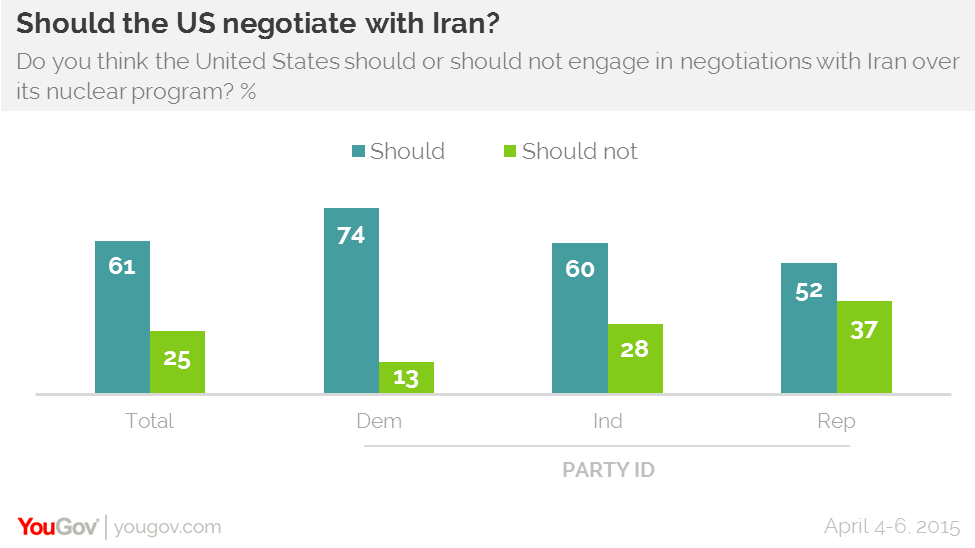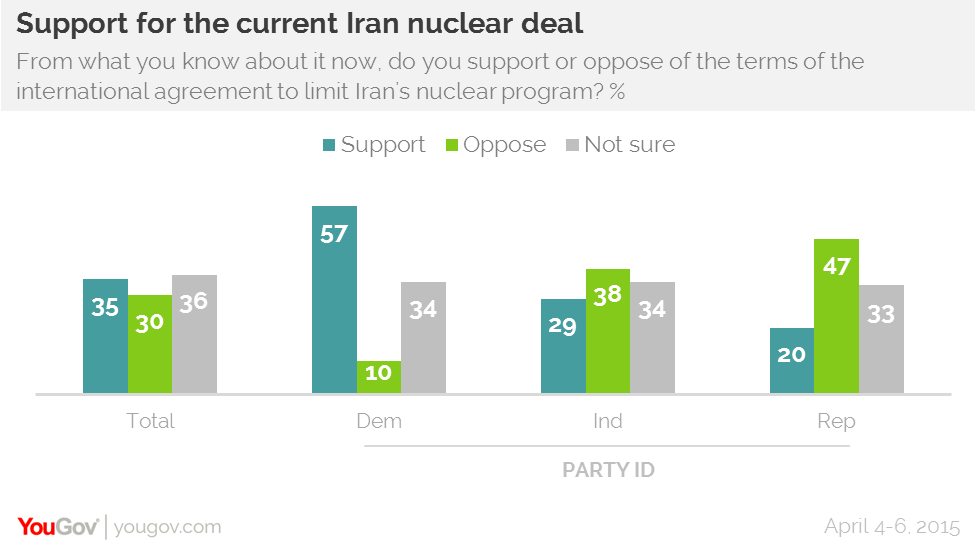The following are key findings from recent polls asking Americans about negotiations with Iran over its controversial nuclear program. In most cases, the polls found that the majority of Americans support talks with Iran or, specifically, the blueprint for a deal announced on April 2.
Zogby Research Services
A poll by Zogby Research Services, commissioned by the Public Affairs Alliance of Iranian Americans, found that a plurality of American voters approve of the April 2 framework for a nuclear deal. The following are excerpted results from the poll conducted May 20 to 31, 2015.
Do you approve or disapprove of the P5+1 framework agreement with Iran designed to place limits on Iran's nuclear program?
Strongly Approve: 11 percent
Somewhat approve: 30 percent
Approve: 41 percent
Somewhat disapprove: 10 percent
Strongly disapprove: 13 percent
Disapprove: 23 percent
Not sure/Not enough information: 36 percent
Would you support or oppose legislation that would make an Iran agreement subject to congressional approval and oversight?
Strongly support: 22 percent
Somewhat support: 30 percent
Support: 52 percent
Somewhat oppose: 7 percent
Strongly oppose: 5 percent
Oppose: 13 percent
Not sure: 35 percent
J Street Poll
On June 10, the pro-Israel group J Street released a poll showing that 59 percent of American Jews — slightly more than the general population* — support a deal with Iran that would lift sanctions in return for Tehran’s acceptance of restrictions on its nuclear program. The following are excerpted results from the survey conducted May 31 – June 3.
When Provided More Details, Support Grows
Now, imagine that the U.S., Britain, Germany, France, China, Russia, and Iran reach a final agreement that places significant limits on Iran's nuclear program to prevent Iran from developing a nuclear weapon.
The agreement imposes intrusive inspections of Iran's nuclear facilities by international nuclear experts, and it caps the level at which Iran can enrich uranium to far below what is necessary to make a nuclear weapon. In exchange for limiting its nuclear program and agreeing to intrusive inspections, Iran would receive phased relief from U.S. and international economic sanctions, as Iran complies with the terms of the agreement.
Would you support or oppose this agreement?
Support: 78 percent total (including 26 percent who strongly support)
Oppose: 22 percent total (including 8 percent who strongly oppose)
*According to a CNN/ORC poll conducted in April 2015
AP-GfK Poll
A survey conducted by AP-GfK from April 23-27 found that a slight majority of Americans approve of the interim agreement reached by Iran and the world’s six major powers in late 2013. The following are key results:
Do you approve, disapprove, or neither approve nor disapprove of the preliminary agreement reached between Iran and six world powers that is designed to curb Iran’s nuclear program?
Total approve | 54 percent |
Approve | 24 percent |
Lean approve | 31 percent |
Neither —don’t lean | 1 percent |
Total disapprove | 43 percent |
Disapprove | 23 percent |
Lean disapprove | 20 percent |
Refused/Not answered | 2 |
As you may know, as part of the preliminary deal Iran agreed to allow inspections of its nuclear facilities, ship plutonium out of the country and shut down almost half of its uranium enriching centrifuges. How confident are you that Iran will follow through with this agreement?
Extremely/very confident | 3 percent |
Extremely confident | 1 percent |
Very confident | 2 percent |
Moderately confident | 25 percent |
Not too/Not confident at all | 69 percent |
Not too confident | 34 percent |
Not confident at all | 35 percent |
Refused/Not answered | 3 percent |
Quinnipiac University National Poll
A majority of American voters support the blueprint for a nuclear deal, according to a new poll by Quinnipiac University conducted April 16-21. The following are key takeaways from the survey’s findings.
· 58 percent support the preliminary agreement with Iran to restrict that country’s program while 33 percent do not.
· 35 percent of voters are “very confident” or “somewhat confident” the agreement would prevent Iran from developing nuclear weapons, while 62 percent are "not so confident" or "not confident at all.”
· Supporting the agreement are Democrats 76 - 15 percent and independent voters 60 - 33 percent, with Republicans opposed 56 - 37 percent.
· 65 percent of voters support making any Iran agreement subject to congressional approval while 24 percent do not.
· 77 percent of voters back a negotiated settlement rather than military intervention to limit Iran’s nuclear program while 13 percent do not.
Suffolk University/USA TODAY Poll
A plurality of U.S. adults approve of the blueprint for a nuclear deal, according to a poll by Suffolk University and USA Today. The following are key results.
- 46 percent approve of the deal to limit Iran’s nuclear program
- 37 percent disapprove
- 18 percent are undecided
Economist/YouGov Poll
A new Economist/YouGov poll found that most Americans support the nuclear talks with Iran. The survey, conducted April 4-6, found that 61 percent of respondents believe the United States should negotiate with Iran over its nuclear program.
But barely a quarter of respondents said they would trust Iran to adhere to an agreement.
Support for the nuclear framework announced on April 2 varied along party lines. Among Democrats, 57 percent support the framework, but only 20 percent of Republicans support it.
Reuters/Ipsos Poll
A new Reuters/Ipsos poll, conducted April 3-7, found that 36 percent of respondents support the preliminary nuclear deal between Iran and the world’s six major powers. When broken down by party, 30 percent of Republicans support the deal compared to 51 percent of Democrats.
| Support | Oppose | Not sure |
Republicans | 30 percent | 30 percent | 40 percent |
Democrats | 51 percent | 10 percent | 39 percent |
Independents | 33 percent | 21 percent | 45 percent |
The poll also found little support for using military force as the sole way to curb Iran's nulcear program. Only 5 percent of Democrats, 11 percent of Republicans, and 6 percent of Independents supported that approach.
NBC News/SurveyMonkey Poll
A new NBC News/SurveyMonkey Poll, conducted April 6-8, found that the majority of Americans consider Iran’s nuclear program a “major threat.” More than 70 percent of Republicans gave that response, compared to just over 40 percent of Democrats.
Iran’s nuclear program is: | All | Republicans | Democrats | Independents |
Major threat | 53 percent | 74 percent | 41 percent | 50 percent |
Minor threat | 37 percent | 23 percent | 47 percent | 39 percent |
Not a threat at all | 8 percent | 1 percent | 11 percent | 9 percent |
Americans United for Change/Hart Research Poll
A poll commissioned by Americans United for Change, conducted April 6-8, found that 65 percent believe Congress should allow the agreement to move forward and monitor its implementation, while 30 percent believe Congress should take action to block the deal before it is implemented.
Congress should: | All | Republicans | Democrats | Independents |
Allow agreement to go forward and closely monitor implementation | 65 percent | 47 percent | 82 percent | 64 percent |
Block the agreement now and prevent implementation | 30 percent | 48 percent | 15 percent | 27 percent |
Bloomberg Politics Poll
Americans are more or less split on whether or not they think the nuclear deal with Iran being negotiated would make the world safer by containing Tehran’s ability to obtain nuclear weapons, according to a new Bloomberg Politics poll conducted April 6-8.
“Last week, the U.S. and five other nations struck a tentative deal with Iran. It would lift sanctions that have damaged Iran's economy in exchange for extensive inspections of any nuclear activity in Iran. Final details will be formalized in June. Are you more optimistic or more pessimistic this deal would make the world safer by containing Iran's ability to obtain nuclear weapons?"
- Optimistic: 49 percent
- Pessimistic: 43 percent
- Unsure: 8 percent


